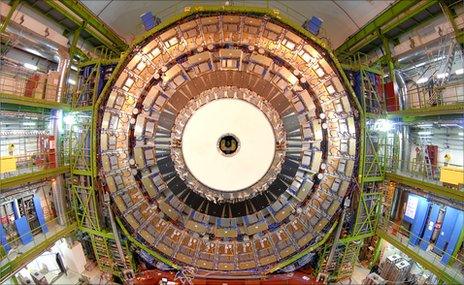Large Hadron Collider (LHC) to run into 2012
- Published

CMS is one of two "multi-purpose" experiments housed at the LHC
The Large Hadron Collider (LHC) is to continue operating in 2012 after officials dropped plans for an extended shut down at the end of this year.
The decision by managers at Cern - the organisation that runs the LHC - was announced in an advisory report.
The machine's advisory committee says the LHC's experiments stand a good chance of finding new physics in the next two years.
The LHC is housed in a 27km-long tunnel under the French-Swiss border.
Most of the time, it smashes together proton particles travelling at close to the speed of light in a bid to uncover secrets of the Universe.
Physicists hope that the LHC could turn up evidence for the elusive Higgs boson particle, which explains why other particles have mass, and for a phenomenon known as supersymmetry.
"For example, if nature is kind to us and the lightest supersymmetric particle, or the Higgs boson, is within reach of the LHC's current energy, the data we expect to collect by the end of 2012 will put them within our grasp," said Cern's Research Director, Sergio Bertolucci.
The LHC was previously scheduled to run until the end of 2011 before going into a long technical stop necessary to prepare it for running the machine at its full design energy of seven teraelectronvolts (TeV) per beam.
However, the LHC is now expected to run at its current energy of 3.5 TeV per beam until the end of 2012.
Earlier this month, a plan to extend the lifetime of a US particle collider - the Tevatron - until 2014 were blocked because of budget problems.
The Tevatron is now due to run until September this year. Unless that machine turns up evidence for the Higgs boson, the LHC will be left as the only machine in the world capable of searching for the elusive sub-atomic particle.
- Published10 January 2011
- Published8 November 2010
- Published2 August 2010
- Published23 July 2010